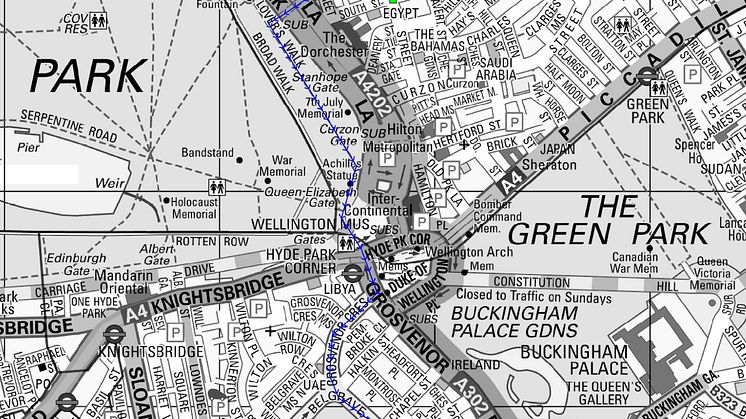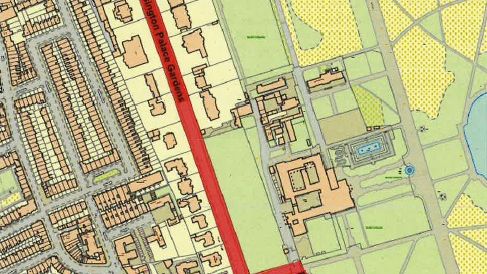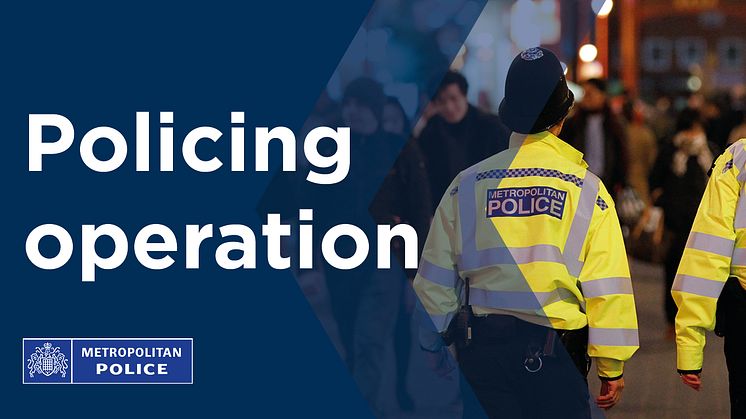
News -
UPDATE: Met response to terror attacks in Israel and ongoing military action in Gaza
The Met's operation to provide reassurance and security to communities across London in response to the terror attacks in Israel and subsequent military action in Gaza is continuing.
The impact of terrorism and armed conflict is rarely limited to where incidents take place. London is a global city and we know that tragically Londoners have loved ones who have been killed, injured or who are missing. Our thoughts are with them at what is clearly a very difficult time.
We know, too, that there is a much wider community impact being felt and that is shaping the policing response we are providing.
Community
The Met has been working closely with representatives from London’s Jewish and Muslim communities since the attacks in Israel.
Officers have been deployed to provide reassurance and to investigate offences in the vicinity of faith schools, places of worship and in those communities where we know the levels of concern are highest.
So far officers have visited 445 schools and 1,930 places of worship. Those visits will continue.
Regrettably, despite the increased presence of officers we have seen a significant increase in hate crime across London.
This includes abuse directed at individuals or groups in person or online, racially or religiously motivated criminal damage and other offences.
Between 1 October and 18 October, we saw 218 antisemitic offences compared to 15 in the same period last year. Similarly we saw an increase in Islamophobic offences from 42, to 101.
These represent percentage rises of 1,353 per cent and 140 per cent respectively.
We continue to encourage anyone who experiences hate crime to report it to the police. It is not acceptable and we will investigate.
So far, we have made 21 arrests for hate crime offences in the community.
For example, this week we have arrested a man on suspicion of defacing posters of missing Israelis in Camden and another man in relation to 10 incidents of Islamophobic graffiti on bus stops in the New Malden and Raynes Park.
Investigations into many more of the reported offences are ongoing.
Protest
We have seen a number of vigils, demonstrations and other public gatherings since the attacks in Israel took place.
On each occasion we have sought to work with the organisers to understand the nature and scale of the planned event and to deploy officers to ensure it can take place safely, with minimal disruption and that any offences can be dealt with.
We are grateful for the collaborative approach of the key protest organisers which we hope will continue. We encourage anyone planning an event to get in touch.
While there have been pockets of disorder and some instances of hate speech, the majority of the protest activity has been lawful and has taken place without incident.
The largest demonstration seen so far took place last Saturday. Officers made 15 arrests for a variety of offences.
In the days after the demonstration we published the images of people we need to identify as part of ongoing investigations. We are grateful to the public for their response to these appeals. Officers are actively exploring a number of lines of enquiry.
Tomorrow (Saturday, 21 October) we are expecting another significant demonstration in central London organised by the Palestine Solidarity Campaign.
The demonstration is due to begin at Marble Arch at midday, proceeding along Park Lane, via Hyde Park Corner, Piccadilly and Trafalgar Square and ending up in Whitehall.
There were concerns that last week, a stage where speeches took place was placed immediately next to the Cenotaph.
This week the stage will be placed away from the Cenotaph, next to King Charles Street.
More than 1,000 officers from the Met will be deployed to police the event. They include public order trained officers, roads policing teams, mounted units, dog units and police staff who are providing essential support.
We are also grateful for the support of the British Transport Police and the City of London Police.
As we have done on previous occasions, we will be inviting representatives from the Jewish and Muslim communities to our operations room so that we can benefit from their valuable insight and advice.
We will police this demonstration impartially, protecting the right to protest while intervening or gathering evidence for subsequent investigation where offences take place.
We will not stand by if we see examples of hate crime taking place. We will intervene.
Conditions
A number of conditions have been imposed on the main demonstration and on a smaller demonstration which is taking place at the same time between the Egyptian and Turkish embassies, organised by Hizb ut-Tahrir Britain.
The conditions are detailed below.
Section 12 Public Order Act:
Any person participating in the ‘Palestine Solidarity Campaign procession must not deviate from the route specified on the map below.
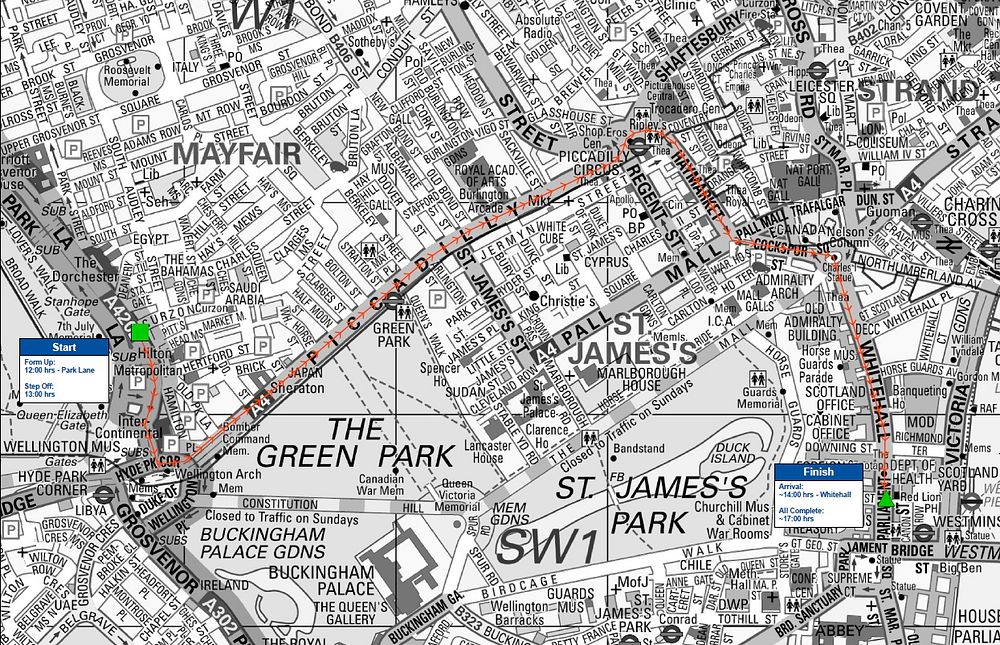
Section 12 Public Order Act:
Any person participating in the Hizb ut-Tahrir Britain procession must not deviate from the route specified on the map below.

Section 14 Public Order Act:
Any person participating in the Palestine Solidarity Campaign protest or the Hizb ut-Tahrir Britain protest must not enter the area shaded in red on the map below.
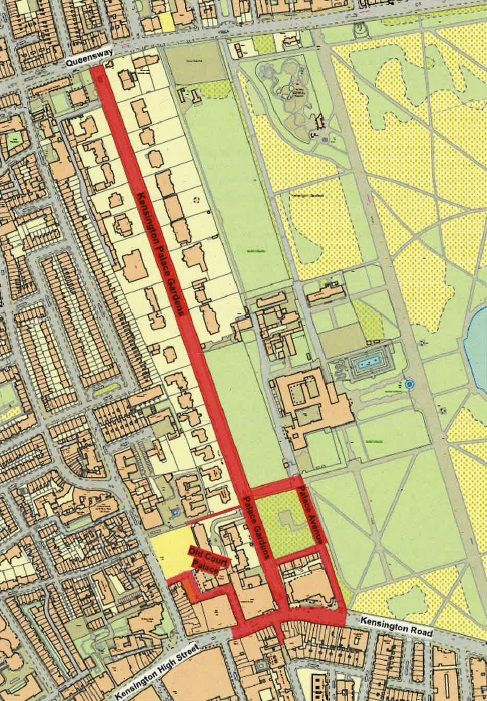
The area in red referred to is in the vicinity of the Israeli embassy.
We will keep the question of further conditions, such as those on face coverings, under review.
Proscribed organisations
It is important to remember that while supporting the Palestinian cause or criticising Israel is not, in itself, unlawful, any support for a proscribed organisation such as Hamas or Hezbollah is unlawful.
Anyone wearing, carrying or otherwise displaying symbols that are supportive of a proscribed organisation can be arrested.
The same is true for chanting or slogans.
There will be some slogans and chants that are obviously lawful or unlawful, but there will be others that are the subject of intense public debate where different groups interpret the language used in different ways.
It falls to the police to weigh up all these factors and to reach a clear position on how officers should be directed to respond, taking into account context, relevant legislation and the practicalities of operational policing.
One particular chant that has been the subject of extensive discussion is ‘Palestine will be free, from the river to the sea’. This is a chant that has been frequently heard at pro-Palestinian demonstrations for many years. We are well aware of the strength of feeling in relation to it.
While we can envisage scenarios where chanting these words could be unlawful, such as outside a synagogue or Jewish school, or directly at a Jewish person or group intended to intimidate, it is likely that its use in a wider protest setting, such as we anticipate this weekend, would not be an offence and would not result in arrests.
This is just one example of the difficult decisions facing officers.
Policing – and in particular public order policing – is rarely as straightforward as it may appear to commentators or the public looking on.
Our officers will use their best judgement to police Saturday’s demonstration and any future demonstrations without fear or favour.
We would ask for the public and the media’s understanding as they do so.
One of London’s great strengths as a city is the way we come together in response to adversity.
We know that there is trauma and suffering in our Jewish and Muslim communities at the moment, but we also know that division between those communities will not benefit anyone.
There will be those who try to use this period of uncertainty as an opportunity to stir up hate but we know there are many more people – from community representatives to faith leaders to ordinary members of the public – who will not let that happen.
As a police service we will continue to support and stand alongside them.

